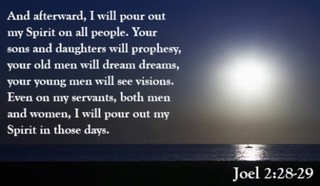
Change Translation
- Recent Translations
- All Translations
Gioele 2:14
Share
Listen to Gioele 2:14
Settings
Scripture Text Size
14
Chi sa se egli si rivolgerà, e si pentirà, e lascerà dietro a sè qualche benedizione, qualche offerta di panatica, e da spandere, da fare al Signore Iddio vostro?
Gioele 2:14 Meaning and Commentary
Joel 2:14
meaning not behind God himself, as if he was departed, or about to depart, for which there was no great concern, provided he left a temporal blessing with them; but behind the army of the locust, after that had made all the devastation it did: or rather "cause to leave"; stop the locust in its progress, and not suffer it to make a total desolation, but cause it to leave some of the fruits of the earth behind it. So Aben Ezra gives the sense of the words,
at least leave so much of the wheat, that a meat offering might be made of it; and so many of the vines, as that so much wine might be produced by them as would furnish out a drink offering to be offered to the Lord, agreeably to the laws given about these; for which the greatest concern is expressed, this being cut off and withheld from the house of the Lord, by reason of the present scarcity, ( Joel 1:9 Joel 1:13 ) ; which shows a truly pious and religious mind, having more at heart the worship of God than themselves and families.
Who knoweth [if] he will return and repent
Which some understand of man, and of his returning and repentance; either thus whosoever he be that knows the ways of repentance, he will return, and God will repent of this evil: which sense is mentioned by Kimchi and Ben Melech: or he that knoweth that iniquity is on him will return and repent; so Jarchi, with which agrees the Targum,
``he that knows that sins are in him will return from them, and he shall obtain mercy; and whoever repents, his sins shall be forgiven him;''but rather they are to be understood of God, as some in Kimchi, and paraphrase it, who knows? perhaps God may return; and this is the sense of Aben Ezra, and seems to be most correct; and to be interpreted, either as carrying some doubt in it; not as if it was questionable whether God will give pardon to repenting sinners, but whether he will at once remove the present affliction and chastisement; which may be thus expressed to check the presumption and awaken the security of the people, and rouse them from their sluggishness and stupidity: or rather as expressive of hope that God would return and change the dispensation of his providence, and repent of the evil he had threatened, or brought upon them; which might be justly grounded upon the character before given of him, and that from the revelation of himself, and the proclamation of his own perfections; see ( Jonah 3:9 ) ; and leave a blessing behind him;
meaning not behind God himself, as if he was departed, or about to depart, for which there was no great concern, provided he left a temporal blessing with them; but behind the army of the locust, after that had made all the devastation it did: or rather "cause to leave"; stop the locust in its progress, and not suffer it to make a total desolation, but cause it to leave some of the fruits of the earth behind it. So Aben Ezra gives the sense of the words,
``perhaps God will return, and cause the locust to leave a blessing;''and to the same purpose Jarchi, of which they make a meat offering and a drink offering, as follows: [even] a meat offering and a drink offering to the Lord your God;
at least leave so much of the wheat, that a meat offering might be made of it; and so many of the vines, as that so much wine might be produced by them as would furnish out a drink offering to be offered to the Lord, agreeably to the laws given about these; for which the greatest concern is expressed, this being cut off and withheld from the house of the Lord, by reason of the present scarcity, ( Joel 1:9 Joel 1:13 ) ; which shows a truly pious and religious mind, having more at heart the worship of God than themselves and families.
Taken from John Gill's Exposition of the Bible
Unlock Deeper Insights: Get Over 20 Commentaries with Plus! Subscribe Now
Gioele 2:14 In-Context
12
Ma pure anche, dice il Signore, ora convertitevi a me di tutto il cuor vostro, e con digiuno, e con pianto, e con cordoglio.
13
E stracciate i vostri cuori, e non i vostri vestimenti; e convertitevi al Signore Iddio vostro; perciocchè egli è misericordioso e pietoso, lento all’ira, e di gran benignità, e si pente del male.
14
Chi sa se egli si rivolgerà, e si pentirà, e lascerà dietro a sè qualche benedizione, qualche offerta di panatica, e da spandere, da fare al Signore Iddio vostro?
15
Sonate la tromba in Sion, santificate il digiuno, bandite la solenne raunanza;
16
adunate il popolo, santificate la raunanza, congregate i vecchi, accogliete i piccoli fanciulli, e quelli che lattano ancora le mammelle; esca lo sposo della sua camera, e la sposa del suo letto di nozze.
The Giovanni Diodati Bible is in the public domain.

